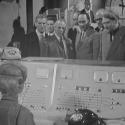The last time I saw Andrew Marr in the flesh was at the Independent’s old offices in Canary Wharf, during a savage round of job-shedding in the late Nineties. To address the staff, editor Marr had jumped upon a table, like Keir Hardie addressing striking miners, and his old-school style of speech-making is perfectly in tune with the politics of the first half of the 20th century. Marr, in truth, wasn’t a very natural newspaper editor - he is a much better working journalist. However his truest vocation may be as a TV historian, because Andrew Marr’s The Making of Modern Britain is terrific stuff, and last night he produced a vivid, anecdote-laden and effortlessly wide-ranging mosaic about the First World War.
His film began with a macabre disinterment from the Flanders mud in which one out of several anonymous coffins was selected by a blindfolded general (an apt metaphor for the whole war, you could say) to be the corspse in the Tomb of the Unknown Warrior in Westminster Abbey - before Marr reeled back to the heady late summer days of 1914 when eager volunteers were determined “not to miss it”. But then we’ve all seen the newsreel footage of excited young men grinning out of troop train windows as they travelled like bank holiday revellers to what was to become known as “the great meat-grinder”. What Marr did triumphantly was to illuminate the war’s back story with the sort of history that has largely been forgotten in the passing emblematic fog of so many Remembrance Sundays.
How, for example, the Admiral of the Fleet, Lord “Jackie” Fisher simply vanished (to be discovered hiding in a room at the Charing Cross Hotel), seemingly driven to breakdown by his arguments with Winston Churchill over the future direction of the sea war. Fisher advocated a direct invasion of Germany’s Baltic coast, while Churchill wanted to knock out Turkey by landing in the Dardanelles. The rest is history, and a somewhat biased Mel Gibson movie.
The German fleet meanwhile turned its guns on Scarborough, Whitby and Hartlepool, the first time civilians had been killed on British soil since the 17th century. Marr described the people’s great shock at becoming targets, and his journalist’s eye for the telling detail brings it all to life. The first bomb of the first Zeppelin raid, Marr tells us, landed on No 16 Alkham Road, Stoke Newington. The first casualties – as their charred remains revealed - was a nearby married couple praying together by their bedside.
Where has all this history been hiding? And the unfamiliar newsreel footage of, for example, mobs in Liverpool smashing up German-owned shops? Marr brings home the febrile atmosphere in Britain during the last months of war, and re-emphasises the point of how, in Wellington’s words after Waterloo, “it was a damned close-run thing”. The U-boats nearly starved Britain into submission, but also brought America into the war. A German offensive by the first “storm troopers” nearly over-ran British lines, until a massive counter offensive (largely forgotten battles described by Marr as “one of the greatest military victories ever won by British forces”) finally decided the Great War.
Next week he covers the 1920s, and how the British psyche reacted to all this unimaginable upheaval and carnage. If it’s only half as good as last night’s instalment, it shouldn’t be missed. For sheer controlled passion, Marr makes Starkey, Schama, Ferguson et al seem mannered hacks, and I suspect that it’s modern British history, and not contemporary Westminster politics, that is Marr's first true love.
- Andrew Marr's The Making of Modern Britain continues on BBC Two. Watch the latest episode on BBC iPlayer here.















Add comment